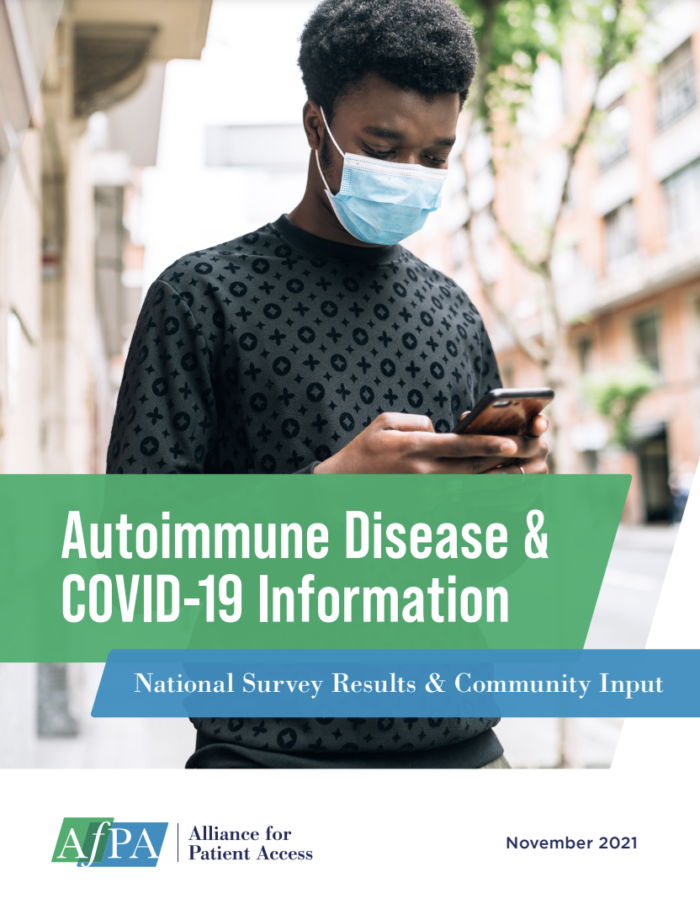Mixed COVID-19 Vaccine Messages Plague At-Risk Patients
November 17, 2021
Mixed messaging on COVID-19 vaccines may heighten autoimmune patients’ risk, new data suggest.
According to a national online survey by the Alliance for Patient Access, autoimmune patients remain confused about the number of vaccine shots they may need, how they should time the shots and whether it’s acceptable to mix and match vaccine brands. Patients also reported varying levels of awareness about the risks they may face, such as being more likely to develop serious illness if they contract COVID-19 and more likely to die from COVID-related complications.
Some medications for autoimmune diseases suppress the immune system, putting these patients among the immunocompromised population that faces higher COVID-19 risk, according to the Centers for Disease Control and Prevention.
Key Survey Findings
Not all patients recognize their risks or have clear information on how to protect themselves.
COVID-19 Risks
Only about half of patients reported being “very aware” that an initial vaccine regimen may not fully protect them and that they may need a third dose to improve their immune response.
- 50% were “unaware” or only “somewhat aware” that they may not be fully protected against COVID-19, even if fully vaccinated
- 58% were “very aware” of their need for a third shot, leaving 42% that were “unaware” or only “somewhat aware.”
Vaccination Concerns
About three-fourths of respondents reported being vaccinated – 71% fully vaccinated and 3% partially vaccinated. About one-fourth, however, reported being unvaccinated. They cited:
- Concerns about vaccine safety and efficacy
- Concerns about vaccine side effects
- Concerns about flare-ups of their autoimmune disease
- Concerns about having to suspend treatment for their autoimmune disease to get the full benefit of the vaccine.
Vaccine Confusion
Patients reported confusion about vaccine protocol.
- 47% were uncertain about whether they need a third vaccine dose or when to get it
- 51% were uncertain about the difference between a third dose and a booster
- 47% were uncertain if a third dose needed to be the same brand as the original series
- 86% felt autoimmune patients need greater awareness of the importance to get a third dose.
Information Sources
- Patients’ (88%) reported that mixed messages from media and government muddled their understanding of how to proceed with vaccines.
- Unvaccinated respondents who reported concerns about side effects were more likely to cite social media or family and friends as primary information sources.
Needs Assessment
Most respondents (89%) said government policies on vaccines should reflect autoimmune patients’ unique needs. Patients reported wanting clearer vaccination guidance that is centralized and pertinent to specific autoimmune conditions. They also want health care providers empowered as sources of up-to-date information on COVID-19 vaccination.
In a statement by the Alliance for Patient Access, Josie Cooper, executive director, remarked, “Forty-one million Americans live with some form of autoimmune disease. We hope these survey results can help policymakers deliver what patients say they need: clear, trustworthy health and vaccine information that speaks to their specific patient population.”
About the Report
The national online ran October 11-19, 2021, and captured responses from people living with rheumatoid arthritis, multiple sclerosis, lupus, systemic sclerosis, Graves’ disease and pemphigus.
Explore the comprehensive survey findings in AfPA’s full report, “Autoimmune Disease & COVID-19 Information.” The report also features on-the-ground insights from patient advocacy organizations that participated in an online roundtable discussion of the survey results.
Categorized in: Blog


